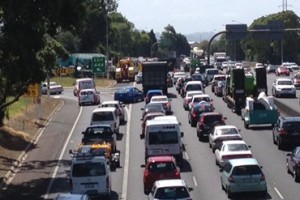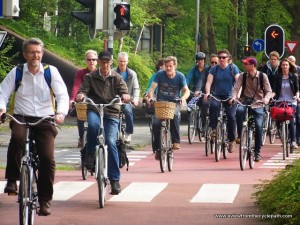UPDATED UPDATE: And Chris Boardman in the UK has also named cycling as a great way to combat obesity.
UPDATE: I thought this post deserved a bump when I saw this article by obesity.org which states that:
New research ties bike-friendly infrastructure changes in United States cities to increases in “active commuting” by bike-riding residents, which can improve and sustain weight and reduce cardiac risk.

The NZ Herald has run yet another scary article on the growing obesity epidemic in New Zealand. According to the article, we are now the fourth most obese country in the world.
As much as I agree with the emphasis on the culture of unhealthy food, there is of course the other side to the equation – a lack of exercise. This is where cycling really comes into its own. You only have to look at the 2014 OECD report on obesity referred to in the article to appreciate the differences.
This shows that cycle friendly countries like the Netherlands and Denmark not only have road traffic deaths at half NZ’s rate but also their obesity rate is just over a third of NZ’s.
Now it is difficult to draw the conclusion that cycling is the panacea to all our obesity woes. Portugal and Italy have very low cycling rates and have low obesity rates while Hungary is one of the stars of modern cycling, but comes in ahead of New Zealand as third most obese. Having lived in that part of the world, I must say I was surprised by that result for Hungary. Hungarians never seemed like very large people to me.

Parallel cultural factors will always play a role but it is true that English speaking countries have a dismal record of obesity (6 of the top 10 obese countries are English speaking) and also corresponding average cycling rates of 1-2%. Most of the countries with low obesity rates have an above average (Finland, Switzerland, Austria, Germany) to excellent (Japan, China, the Netherlands, Denmark, Sweden) cycling culture.
Weight gain is a simple formula of energy in, energy out. A good cycling culture, one that recognises cycling as an everyday activity, is certainly one way to bring some energy balance back to our lives – especially when we are busy and it is hard to find time to get to the gym or for a run. This has recently been acknowledged in the UK.
Cycling as a means of transport is a great way to incorporate exercise into our working day. But first we need to make it feel safe and create the 8-80 culture that makes it work. For that we need separated cycle infrastructure on arterials, direct routes for cyclists over cars and slow speeds on non-arterials. The obesity epidemic and our high traffic death rates are increasingly making this a matter of life or death for many NZers.



